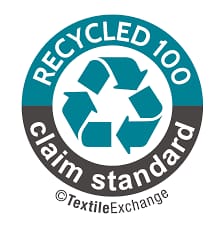TEAM CERTIFICATIONS

What is RCS?
The Recycled Claim Standard (RCS) is a voluntary, international content claim standard that gives credibility to recycled material claims by tracking recycled input through the supply chain of products.
The RCS is a chain of custody standard that uses the requirements of the Content Claim Standard (CCS) for fabrics, clothing, garments, accessories, and more.
The goal of the Recycled Claim Standard is to drive higher percentages of recycled content in products and reduce the harmful impact of production on people and the environment.
Why RCS?
The RCS certification aims to enhance the use of recycled materials to promote
sustainable consumption and a production model that reduces the consumption of resources, such as virgin raw materials, water, and energy.
The Recycled Claim Standard also provides a tool for companies to validate and communicate sustainability claims about their products.
The RCS certification verifies essential practices at the beginning of the supply chain and tracks the material to the final product. It offers brand protection, confidence in sourcing, and greater credibility.
By verifying the claims made to consumers, the RCS certification provides a credible voice for suppliers and brands. It leads to higher confidence with a system of standards recognized internationally.
After understanding the definition and benefits of RCS,
what is the process of applying for RCS?
RCS is maintained and managed by the global non-profit organization “Textile Exchange” and they are considered as accredited body of RCS. There are a few RCS approved certification bodies in Pakistan:
⦁ GCL International
⦁ ALGI Pakistan
RCS verifies recycled content in products along the supply chain and tracks the material from its first processing to the final product. Each organization is checked by an independent third-party.
Here is how the RCS certification process looks like step-by-step:
⦁ Choose a certification body and fill out the application form.
⦁ Sign a contract with the certification body.
⦁ Read the standard and prepare relevant documents.
⦁ Review documents and procedures against the RCS requirements.
To sum up, RCS is a great tool to verify the content claims of products to customers. However, the Recycled Claim Standard does not address social or environmental aspects of processing and manufacturing, quality, or legal compliance.
It does not guarantee that products only contain harmless chemicals. It does not ensure socially responsible manufacturing, good working conditions, or environmental stewardship either.
In conclusion, RCS is the first step for companies that going towards green & sustainable business direction.
Does your company want to catch up with the current trend in the market? Do not hesitate to contact us for a detailed consultancy session!
⦁
⦁ Wait for the result of the audit and subsequent certification decision.
⦁ Act on a corrective action plan if there are non-conformities.
⦁ Receive a scope certificate when all requirements are met.
⦁ Prepare for unannounced inspections that verify standard compliance.
⦁ Contact the certification body to apply for a transaction certificate (TC).
Transaction Certificates
Transaction certificates are obligatory for all RCS purchases. They confirm that products conform to the standard requirements and are requested from the supplier at the time of purchase.
Transaction certificates are checked annually during audits. Issuing them involves additional costs. Products cannot be considered certified without their relevant transaction certificates.
⦁
RCS Labels
The RCS certification offers two product labels:
⦁ RECYCLED 100
⦁ RECYCLED BLENDED
⦁ The RCS 100 guarantees that the product
contains 95-100% recycled content without any non-certified material of the same type.
The RCS Blended guarantees that the product contains 5-95% recycled content with no other restrictions on the remaining content.
Each stage of production is required to be certified, from the recycling stage to the last seller.
Feel Free To Contact
Need A Free Estimate?
Rutrum ut volutpat scelerisque auctor ultrices lectus ultrices ullamcorper massa diam etiam amet a, nulla pulvinar sapien.
